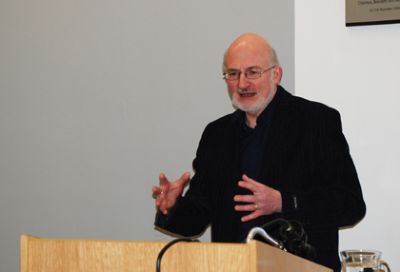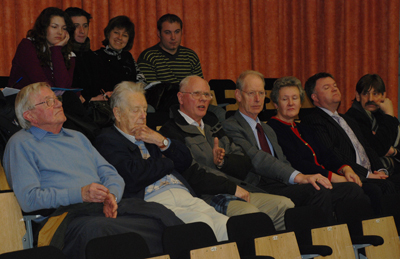Through the Bottleneck
A talk by Howie Firth given at Horizon Scotland, near Forres, some time ago, looked at the wider context of the challenges that face us all today. A copy of the full talk is available in pdf format for download. Here is an outline.

He set out the details of the three crises we now face, globally and nationally.
The roots of the global crisis lie in the huge inflation of credit supply – with consequences foreseen a decade ago.
The environmental crisis has developed from the rate at which we have been producing greenhouse gases – with changes in climate forecast in detail more than twenty years ago.
The resource crisis comes from the declining rate of discovery of new oilfields, which has been falling away since the mod-1960s.
The question now is: when will we realise that we are in a situation like that of a war? – one in which decisions have to be taken urgently, and acted on.
1. Renewables. Develop these strongly, on a community and householder basis. For larger wind-farms, 50% of the profits should go to the community. Develop local venture capital funds, to let local savers invest in wind-farms – with the funds guaranteed by the government, just as they have guaranteed the banks.
2. Affordable housing. Act now, to avoid losing the young people who are needed to solve the problems of the future. There are designs for affordable energy-efficient housing in existence – we just need someone to put them into practice.
3. Energy-efficient building. Set a zero-energy target for all houses. Put grant funding into energy-efficiency measures for older houses. For new houses, modify the building regulations and provide financial support for energy-efficiency measures. All new public buildings should be zero-energy.
4. Turn waste into resources – and local employment.
5. Encourage public transport. Bring bus and rail stations together. Tackle the problem of slow vehicles on overcrowded roads by making more lay-bys – plus a law requiring vehicles to give way if more than five others are in a queue behind. Make it easier – and cheaper – to travel by rail. Add bypass track on single-line routes. Try out the new lightweight railcars, powered by a hybrid LPG-flywheel system, which give seven-and-a-half times the mileage per gallon.
6. Move faster on fuels for the future. 50%-mix biofuels are here now, the bio part coming from animal rendering waste. Methanol also has potential for the immediate future as it can be burned in existing engines. It can be produced from biofuel, so we could be using it now.
7. Marine resources. Seaweed has in the past been a source of fertiliser, fuel, food and industrial chemicals. It can be so again, if the necessary research is carried out.
8. Food. With our reliance on imports and the supermarket chains, the UK has a 'just-in-time' system, with no more than about three days' supply of food in the system. It is urgent to expand food production in every way – to grow more, to grow a wider range of crops, and to make more varied use of them.
9. Identify new technology. If today's technology does not do enough, we need to come up with newer and better ideas. Scientists and engineers always respond to a challenge – so we need to give them the challenges. Sometimes the technology is already there, and just requires an energetic community to apply it imaginatively.
10. Drastically change attitude. Somehow, we have to find ways to wake up to the challenges ahead – and up the pace towards tackling them.
To download a full copy of the talk in pdf format, click here.

